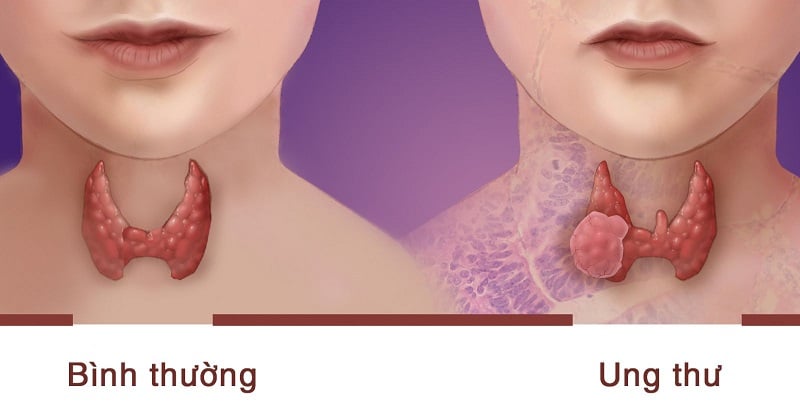Causes of goiter
Goiter is a disease of the thyroid gland, an endocrine gland located in the front, lower part of the neck, pressing on the sides of the larynx and the first rings of the trachea.
Goiter includes many types such as: Benign goiter, Basedow's disease, cancer, thyroiditis... which change thyroid function and lead to hyperthyroidism or hypothyroidism in patients.
There are many causes of goiter such as:
- Due to iodine deficiency
- Due to the patient using drugs or fast food
- Due to congenital or acquired autoimmune disease
- Due to hormonal changes during pregnancy or breastfeeding.

Symptoms of benign and malignant goiter
When suffering from goiter, patients often have symptoms such as weight loss, swollen neck, insomnia, weight gain, hair loss, hand tremors, anxiety, sweating... It is necessary to be examined and conduct tests to accurately determine this disease.
Most thyroid tumors are benign, but about 5% are malignant (thyroid cancer). After examination, ultrasound, blood test, cell aspiration... to determine the type of goiter. In particular, when a malignant goiter has just started, it will not cause any abnormalities and will only be detected through ultrasound examination or by chance when CT, MRI, PET scan of the neck for other diseases.
Symptoms appear as the tumor progresses.
- Tumor in the neck: We can recognize that benign tumors will move up and down when swallowing, while malignant tumors will not move when swallowing.
- Hoarseness: The voice becomes hoarse because the laryngeal nerves, which control the muscles that open and close the vocal cords, are located behind the thyroid gland. As the condition worsens, thyroid tumors can spread and severely damage the voice box.
When examining the thyroid tumors, they are hard, have clear edges, rough or smooth surfaces, and move with swallowing. There are lymph nodes in the neck, small, soft, mobile, and appear on the same side as the tumor.
Symptoms of late thyroid cancer
In the late stages, malignant tumors have symptoms such as:
- Large, hard, fixed tumor in front of the neck.
- Severe hoarseness, difficulty breathing
- Difficulty swallowing, difficulty swallowing, pain due to tumor compression
- The skin in the neck area is dark, bruised, even ulcerated and bleeding.
- When ultrasound clearly shows thyroid tumors, thyroid cancer is clearly detected.
4. Methods of treating goiter
There are many methods of treating goiter, depending on the condition, the doctor will prescribe 1 of the following 3 methods:
Patients will take radioactive iodine, which will then travel through the bloodstream to the thyroid gland to destroy the cells. This method is effective in about 90% of cases, with 50-60% of patients experiencing a reduction in goiter size after 12-18 months.
If the patient has hypothyroidism, the doctor will prescribe thyroid hormone replacement drugs. These drugs will slow the release of thyroid-stimulating hormone from the pituitary gland, helping to shrink the goiter. If the cause is thyroiditis, the doctor will prescribe aspirin or corticosteroids to treat it.
If the goiter is large, causing discomfort, difficulty breathing or swallowing, the doctor will prescribe surgery. The doctor will choose one of the following methods: lobectomy, near-total thyroidectomy, total thyroidectomy, or isthmusectomy. In addition, in some cases, needle aspiration may be used to remove fluid from the goiter (called a thyroid cyst).
Should goiter be operated?
Most goiters are benign and almost never require surgery. Surgery is only indicated in cases where it is absolutely necessary. Benign goiters that require surgery include:
- Benign tumors cause difficulty breathing, difficulty swallowing, or loss of aesthetics.
- Malignant goiter
- Neck surgery is required when thyroid nodule is malignant (cancerous): malignant nodule is diagnosed by biopsy.
- Thyroid nodules with biopsy results that are non-malignant but suspicious for malignancy (cytological or ultrasound).
- Goiter has a family history of thyroid cancer.
- Goiter large enough to cause compression and symptoms for the patient.
Note : Goiter is a common problem, usually benign so surgery is not necessary. When the goiter is benign, small, does not cause discomfort, does not need treatment and monitoring by regular check-ups every 1-2 years. Therefore, patients do not worry too much when they know they have goiter. However, patients should pay attention to see a doctor immediately if there are changes in the neck area or abnormalities in the body such as: Thyroid dysfunction of the hyperthyroid type.
Source: https://giadinh.suckhoedoisong.vn/bieu-hien-cua-buou-co-lanh-tinh-va-ac-tinh-172240929152110614.htm


![[Photo] General Secretary To Lam meets voters in Hanoi city](https://vphoto.vietnam.vn/thumb/1200x675/vietnam/resource/IMAGE/2025/9/23/d3d496df306d42528b1efa01c19b9c1f)
![[Photo] Editor-in-Chief of Nhan Dan Newspaper Le Quoc Minh received the working delegation of Pasaxon Newspaper](https://vphoto.vietnam.vn/thumb/1200x675/vietnam/resource/IMAGE/2025/9/23/da79369d8d2849318c3fe8e792f4ce16)
![[Photo] Prime Minister Pham Minh Chinh chairs the 14th meeting of the Steering Committee on IUU](https://vphoto.vietnam.vn/thumb/1200x675/vietnam/resource/IMAGE/2025/9/23/a5244e94b6dd49b3b52bbb92201c6986)


![[Photo] The 1st Congress of Party Delegates of Central Party Agencies, term 2025-2030, held a preparatory session.](https://vphoto.vietnam.vn/thumb/1200x675/vietnam/resource/IMAGE/2025/9/23/e3a8d2fea79943178d836016d81b4981)























































































Comment (0)